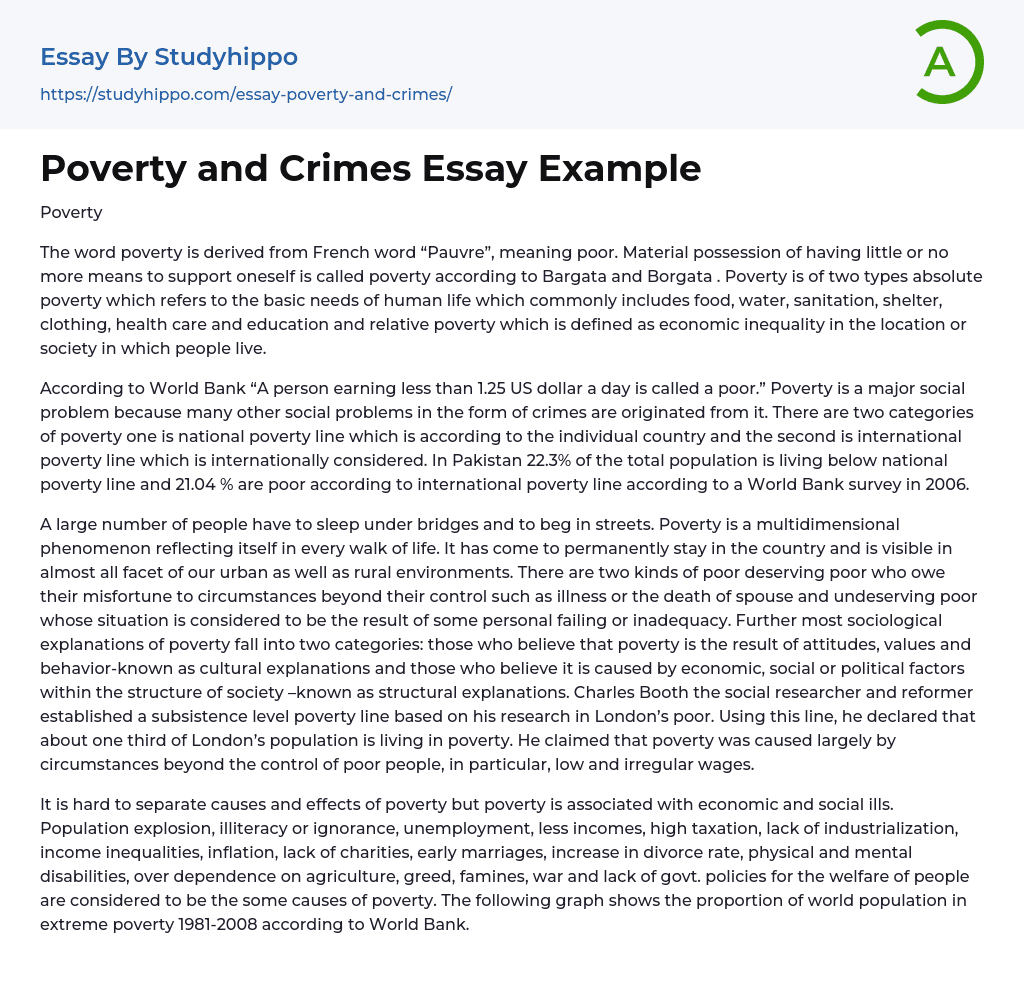Bargata and Borgata describe poverty as the condition of not having enough material resources to sustain oneself.
There are two types of poverty: absolute poverty and relative poverty. Absolute poverty refers to the lack of basic human needs such as food, water, sanitation, shelter, clothing, healthcare, and education. On the other hand, relative poverty is characterized by economic inequality within a particular location or society. span> while 21.04% are considered poor based on the international poverty line according to a 2006 World Bank survey. As a consequence, many people resort to sleeping under bridges and begging in the streets.
Poverty is an all-encompassing problem that affects different aspects of life and has become a permanent fixture in our nation, impacting both urban and rural areas. There are two distinct groups of impoverished individuals: the deserving poor, who face uncontrollable circumstances like illness or the loss of a spouse, and the undeserving poor, whose situation is attributed to personal deficiencies. Sociological explanations for poverty can be categorized into two groups. Cultural explanations propose that poverty originates from attitudes, values, and behavior, while structural explanations argue that poverty results from economic, social, or political factors deeply embedded within society's structure. Charles Booth, a social researcher
According to the World Bank, individuals earning less than $1.25 a day are considered poor. Poverty is a significant social issue as it often leads to various other problems such as crime.
Poverty can also be divided into national poverty line and international poverty line. The national poverty line is determined by each individual country while the international poverty line is universally recognized.
In Pakistan 22.3% of the population lives below the national poverty line
...
and reformer, conducted a study on impoverished communities in London which led to the establishment of a poverty line based on subsistence levels. According to this standardized measure, around one third of London's population lives in poverty.
The argument suggests that poverty is mainly caused by factors beyond the control of individuals living in poverty, especially low and inconsistent wages. Identifying the root causes and consequences of poverty is a difficult task, but it is closely related to economic and social issues. The causes of poverty include population growth, lack of education or knowledge, unemployment, inadequate incomes, high taxes, absence of industrialization, income disparities, inflation, scarcity of charitable organizations, early marriages,
rising divorce rates,
physical and mental disabilities,
overreliance on agriculture,
greed,
famines,
wars,
and insufficient government policies for citizen welfare.
The graph displays how the percentage of the global population living in extreme poverty changed from 1981 to 2008, according to data from the World Bank. In 1995, the South Asian Association for Regional Cooperation (SAARC) designated it as a year dedicated to combating poverty. Additionally, October 17 is internationally recognized as a day devoted to eradicating poverty. The Chronic Poverty Research Center (CPRC), which was established in 2000 and received initial funding from the UK’s Department for International Development, is an international collaboration involving universities, research institutes, and NGOs.
In Pakistan, there exists a connection between poverty and crime due to individuals facing limitations caused by limited economic resources and earning opportunities. These constraints make it difficult for people to meet their basic needs and access essential services like healthcare, education, transportation, clothing, nutritious food, and adequate housing. As a result of unmet life necessities frustration often arises.
This frustration results in the commission
of crimes, as poverty is considered unacceptable by all except for the devout religious dervishes or sufis or mystics. Even ordinary people expect a certain standard of living, which agrees with George Bernard Shaw's assertion that "very few individuals can afford to be poor", a statement that remains completely true.
Poverty and crime are closely intertwined, although not all impoverished individuals are criminals and not all criminals are impoverished. However, it is often those in poverty who are more prone to engaging in criminal behavior. The causes and effects of poverty significantly contribute to these crimes. In reality, everyone has an equal potential for wrongdoing. So what prevents us from resorting to criminality? Is it our innate goodness or a lack of rational thinking? Perhaps if we were less fortunate and struggling for basic necessities, we would feel compelled to commit crimes. It is undeniable that those living on the streets, without shelter or enough food for themselves and their loved ones, cannot survive solely based on moral principles alone. It is this desperation that motivates impoverished individuals to seek solace through illegal activities.
The main cause of poverty is situational rather than innate. The existence of a wide gap in wealth between the richest and poorest worsens this issue. Poverty, as an economic problem, greatly affects people as they struggle to fulfill their basic needs and find a way out of their desperate situation. This extreme desperation is the root cause of different types of criminal behavior. As mentioned, "Crimes provide a means for impoverished individuals to acquire material possessions that they cannot obtain through legal methods."
- Overpopulation essays
- Homelessness essays
- Hunger essays
- Dumpster Diving essays
- Homelessness In America essays
- Abortion essays
- Abuse essays
- Animal Rights essays
- Animal Testing essays
- Assault essays
- Bullying essays
- Controversial Issue essays
- Crash essays
- Cyber Bullying essays
- Feminism essays
- Human Rights essays
- Immigration essays
- Inequality essays
- Poverty essays
- Prejudice essays
- Racism essays
- Torture essays
- Violence essays
- Adaptation essays
- Adventure essays
- Adversity essays
- Aging essays
- Alcohol essays
- Barbie Doll essays
- Beauty essays
- Care essays
- Carpe diem essays
- Change essays
- Chess essays
- Chicken essays
- Choices essays
- Contrast essays
- Crops essays
- Development essays
- Dream essays
- Evil essays
- Experience essays
- Family essays
- Farm essays
- Fire essays
- First Love essays
- Focus essays
- Greed essays
- Hero essays
- Holiday essays




